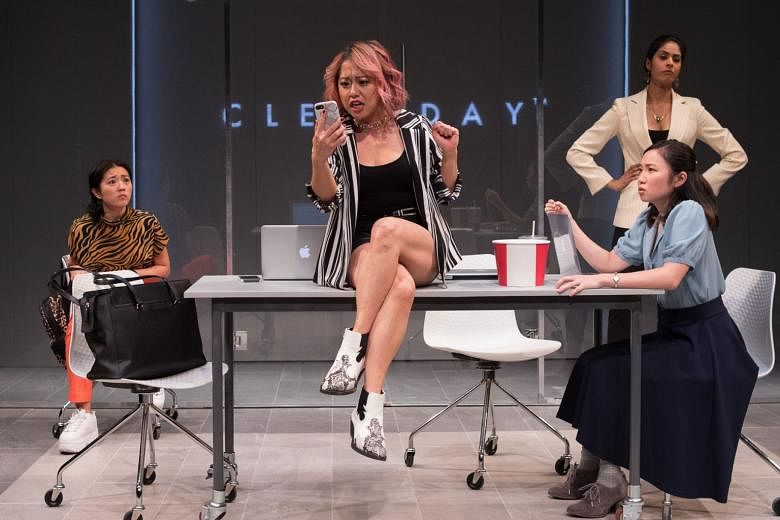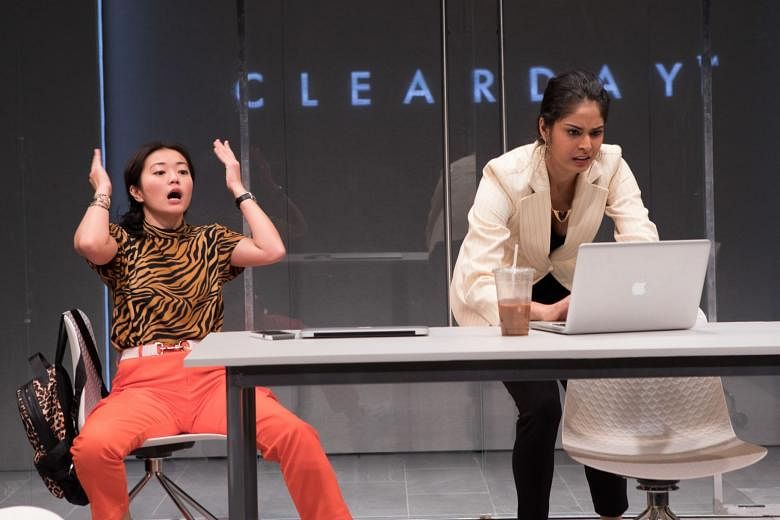Fictional Singapore-based cosmetics start-up Clearday is in trouble.
A draft of a very racist advertisement for its upcoming skin-whitening cream has leaked online and is going viral, threatening to bring down the entire company and forcing the all-female team to do damage control.
The scenario, inspired by real-life controversial ads for cosmetics and laundry detergent, forms the premise of White Pearl, a satirical play by Thai-Australian playwright Anchuli Felicia King. It opened in Washington last Wednesday, following stagings in London and Sydney.
The comedy delves into a host of complex issues both familiar and foreign to its Western audiences: corporate culture, the beauty industry's monetisation of women's insecurities and its gold standard of whiteness, and hierarchies and discrimination among Asian communities.
The last element especially is a rarity in America, where unpleasant tensions and historical animosities among Asian communities, as well as ingrained prejudices, including anti-blackness, can be overlooked in service of a less thorny Asian tale.
"What the play explores is how Asia isn't a monoculture. It's actually a lot of very disparate cultures with long histories of conflict and tension with each other," Ms King, 25, told The Sunday Times.
This resonates with the Asian diaspora, she said, but is not something that everyone in the audience - which has so far come from very international cities - is aware of.
With the six women characters, who hail from six different countries and are of five different ethnicities, Ms King fleshes out the ingrained prejudices that are not so uncommon in their communities.
The play also unflinchingly holds a mirror to the uncontroversial acceptance of colourism and racist attitudes against Africans and African-Americans among Asians.

Shanghai-born China market head Chen Xiao, who green-lit the ad, and her South Korean chemist colleague Soo-jin, are baffled that the ad is considered offensive, and adamant that its non-westernised Asian viewers will find it as funny as they did.
But Indian-British Priya, the fictional firm's chief executive, and her Chinese-Singaporean second-in-command, Sunny, who are more plugged into Western discourses on racism, are appalled by the blatant anti-blackness of the ad, which caricatures an African-American woman as a stand-in for ugliness.
Ms King, who spent her childhood in the Philippines and Thailand before moving to Australia, drew inspiration from her real-life encounters with skin-whitening beauty products. "Every time I go back to Thailand, I struggle to find normal products like sunscreen and soap without whitening elements," she said.
The play also highlights the uneven power dynamics "between so-called westernised Asians and homeland Asians, and the way that facility with the English language and westernisation have created a global colonial hierarchy," said Ms King.
In the play, Priya looks down on her Chinese, Japanese and Korean underlings for their imperfect English and non-Western education. In turn, they judge her for not being an "authentic Asian".
Said Ms King: "The play explores... the tensions between people who are being judged for being alienated from their culture, and people who feel that they are ill equipped to deal with a global economy."
The cultural melting pot of Singapore, as well as its embrace of start-up and Silicon Valley corporate culture, was what drew Ms King to set her play in the Republic.
Ms King has visited Singapore several times and has friends from there. And while there are no plans yet to take the play to Singapore after it closes on Dec 8, she hopes to.
Ms King and the actresses, including Singaporean Jody Doo, who plays Sunny, hope that the play will sharpen its audience's understanding of Asian societies and their specificities.
Ms Doo, 31, who moved to New York six years ago to study acting and pursue a career in it, cited her experience of turning down a callback for a commercial in which an American casting director tried to cast her as a Malay girl who wore a tudung.
Ms Doo said: "I told her I could not, because I have Malay friends back home and I look nothing like them. And they put a tudung on for religious reasons. You cannot just slap a tudung on me and try to pass me off as a Malay Malaysian."
She added: "This play is great because there are six different kinds of Asians in one play, and we are so different on stage. So I hope this helps inform people that we are not homogeneous in 'the East'."




